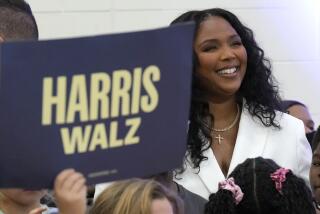Kerry Sees Face of Joblessness
- Share via
ANN ARBOR, Mich. — Sen. John F. Kerry met the voter he was looking for Wednesday.
As the presumed Democratic presidential nominee wrapped up a three-day bus tour through Midwestern states battered by manufacturing job losses, he ran into Alvie Hurst, 58, who last September lost his job as a truck driver for a local steel plant. At a town hall meeting in Toledo, Hurst told Kerry that when the plant closed because of competition from cheaper foreign production, he was out of luck.
“Here I am with no health insurance, and nothing to help me right now. Me and my wife, we’re both laid off,” Hurst said solemnly. “I just want to feel like there’s some hope.”
Kerry, who spent the last three days appealing to those hardest hit by the siphoning of jobs overseas, embraced Hurst -- figuratively and literally. The encounter gave the Massachusetts senator a chance to humanize the job creation proposals that he had been promoting across a swath of states this week.
In Toledo, he called Hurst “the face of Ohio, Iowa, West Virginia, Pennsylvania” -- all battleground states in the presidential campaign that had suffered significant job losses since President Bush took office.
Later in Ann Arbor, Kerry invoked Hurst twice in a speech about his plans for revitalizing the manufacturing sector.
On Monday and Tuesday, Kerry’s proposals were overshadowed by sharp-edged exchanges between him and the Bush campaign. Led by Vice President Dick Cheney, Republicans questioned Kerry’s national security credentials; the Massachusetts senator responded by calling on Bush to prove that he had fulfilled his duty to the National Guard in the early 1970s.
But on Wednesday, Kerry stuck squarely to economic issues, trying to seize on the beleaguered state of manufacturing in the Midwest. It’s a theme he is expected to hammer on throughout the year, especially as he battles to win Ohio, a pivotal swing state.
The president’s reelection campaign is fighting just as hard to neutralize economic worries in Ohio, which voted narrowly for Bush in 2000.
On Wednesday, the Bush campaign released a memo citing news reports that the country’s manufacturing sector was on the upswing and that jobless claims had dropped.
“I think voters understand that the economy is growing, that the president’s policies have led America out of recession,” said campaign spokesman Steve Schmidt. “John Kerry’s pessimism and talking down of the economy are very much disconnected from the economic reality in America today.”
But Kerry told several hundred people in Toledo’s UAW Local 12 that the new jobs being created did not pay as much as those that had been lost.
“Anybody able to keep up paying the bills?” he asked.
“No!” answered the audience.
“My friends, where’s the president?” Kerry asked. “Where’s the plan to deal with this?”
When Hurst stood up and spoke a few minutes later, the candidate stood still and faced him, listening intently.
“Even though I’m in a hard way, there’s a lot of people who’ve got it a lot harder than me,” Hurst said. “I want you to know, I’m going to work as hard as I can to make sure you become president, because I feel like you’re the man we need.”
After slinging his arm around Hurst, Kerry thanked him for his “eloquent” remarks and talked about a plan to expand healthcare.
“He’s worked 30 years for a company -- 30 years -- and when that shuts down, no pension, no pay, no healthcare,” the senator said, shaking his head.
Afterward, an aide invited Hurst and his wife to meet with Kerry privately.
During a speech at a community college in Ann Arbor a few hours later, the candidate pledged to help new small and medium-sized businesses gain more start-up financing. That would help spur the creation of high-technology manufacturing jobs, Kerry said.
“It’s simply a false choice to think that new age technology and new age manufacturing cannot go hand in hand,” he said.
Kerry recalled the story that Hurst told him earlier in the day, saying the truck driver and other workers feel abandoned.
“The bottom line is this: I believe the best days of the industrial Midwest are not behind us -- I think that they’re ahead of us with the right leadership,” Kerry said. “We just need to harness the skills.”
During his stop In Toledo, Kerry was dogged by the flap over his recent assertion that he did not own an SUV and that a Chevy Suburban that his wife drives belonged to the family, not him personally.
In Toledo, a small clutch of protesters chanting “Four more years!” stood next to a SUV emblazoned with a sign: “This isn’t my SUV. It belongs to my wife.”
Later, in an interview with an NBC affiliate in Ann Arbor, Kerry tried to set the record straight.
“I own a Dodge 600 that I’ve had for about 20 years. I own a Chrysler 300M,” he said. . “And my wife has a number of different cars in some different locations. We have a Chrysler van ... Chrysler PT Cruiser, a Suburban Chevy and a Land Rover Defender.”
“So you’ve bought mostly American?” asked the reporter.
“Almost all American, yes ma’am,” he said.
Minutes later, he added: “The ones I’ve personally bought are American.”
More to Read
Get the L.A. Times Politics newsletter
Deeply reported insights into legislation, politics and policy from Sacramento, Washington and beyond. In your inbox twice per week.
You may occasionally receive promotional content from the Los Angeles Times.










